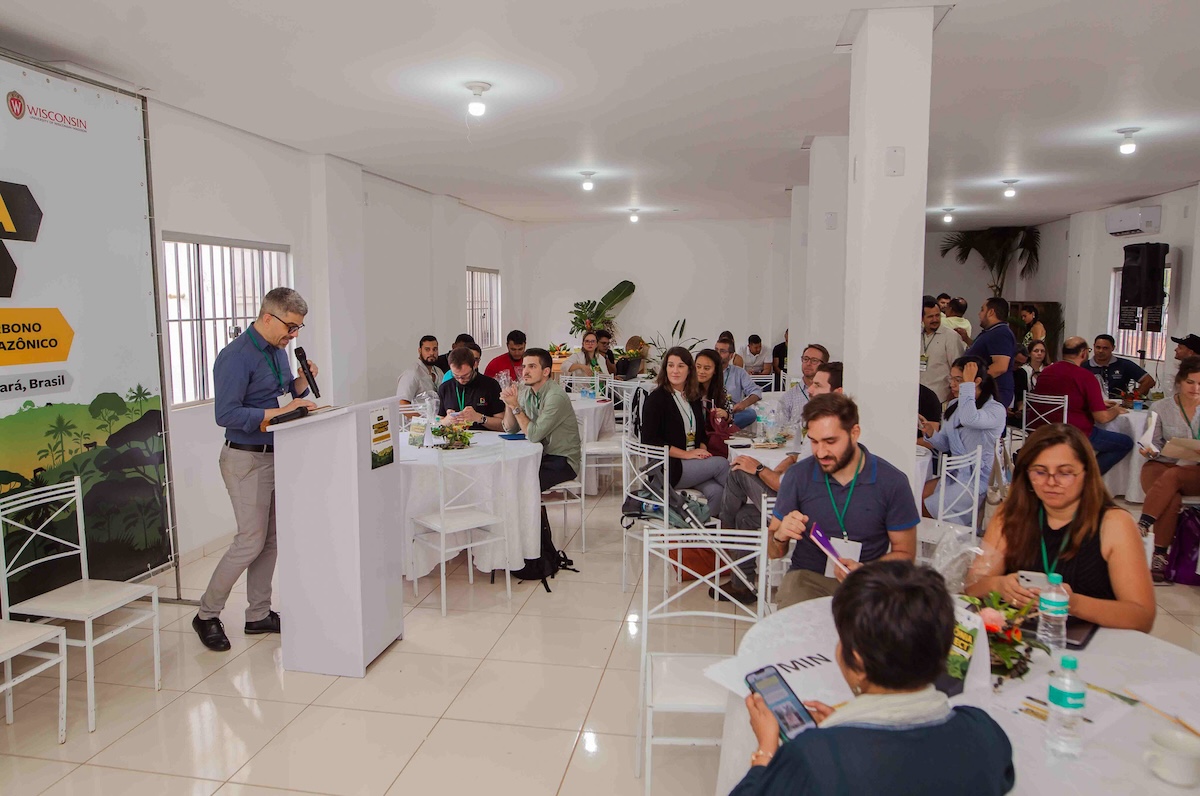Last November, nearly 80 guests gathered in Novo Repartimento (PA), a municipality where consortium partners in Amazonia Connect are working to promote low-carbon agriculture and deforestation-free livestock chains.
Presenters shared the results of the first year of the initiative, a partnership between the United States Agency for International Development (USAID), Solidaridad, Earth Innovation Institute, National Wildlife Federation, and the University of Wisconsin-Madison. Achievements include working with 700 small-scale livestock farming families in the municipalities of Novo Repartimento, Anapu and Pacajá, in Transamazônica Pará, and the implementation of good agricultural practices across more than 23,00 hectares.
“When we feed our courage more than our fears, we break down walls and start building bridges. This project that promotes low-carbon livestock farming is a bridge that connects livestock producing families with the future. And the future that humanity calls for is one in which we can combine food production with sustainability and climate efficiency.”
said Paulo Lima, Program Manager at Solidaridad Brazil
Bella Genta, USAID Environment and Natural Resources Officer, shared opening remarks highlighting the commitment made by Amazonia Connect partners to the conservation of the Amazon biome in Brazil, Colombia and Peru.
“Rich in biodiversity, the Amazon is also home to rural producers who play a fundamental role in the production of essential agricultural commodities, such as beef, palm oil and coffee, important for the entire world,” she said.
“ If we want to maintain production, support local livelihoods and conserve our natural heritage, it is imperative to address the challenges faced by producers and promote sustainable practices. Amazonia Connect is committed to achieving this by promoting techniques that improve productivity, reduce greenhouse gas emissions and improve biodiversity conservation.”
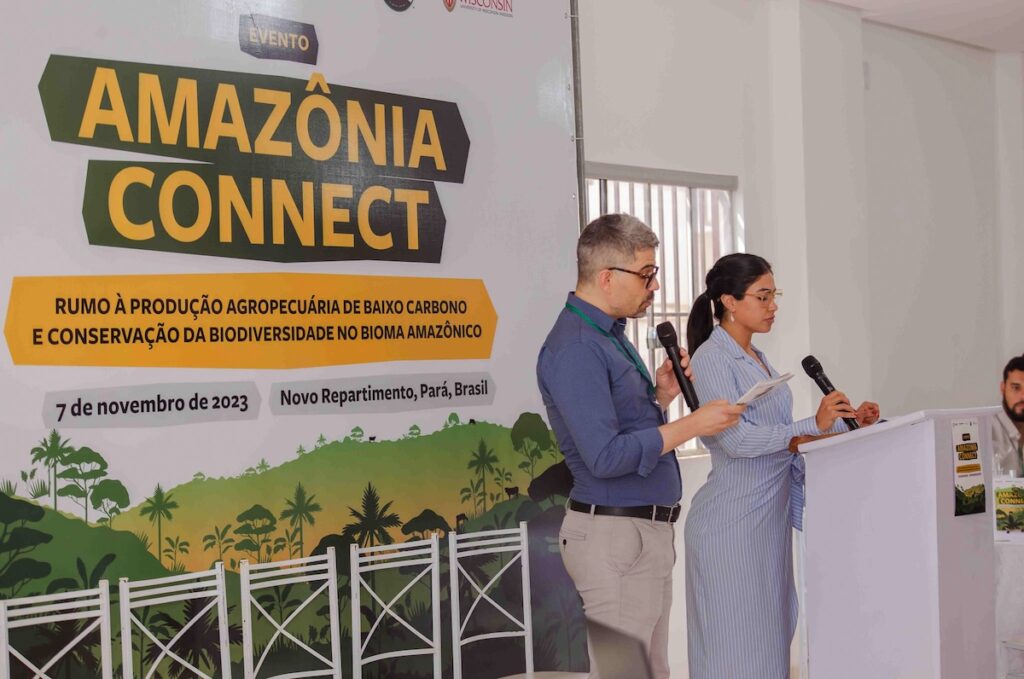
Farmers in Focus
Livestock producers were the protagonists of the day with a number of them on panels and in the audience. Ananias Oliveira, a rancher at Fazenda Rio Madeira, shared the benefits of rotational grazing, a technique for intensifying livestock farming.
“[In the past] we raised cattle on a large pasture, but that same amount [of cattle] could be raised on a small area. Previously, if we wanted to raise more, we would just deforest more to open pasture. But the training showed that it was possible to raise more cattle in the existing open area on my property,” commented Ananias.
Paulo Lima highlighted the difficulties encountered by rural producers, like Ananias, in their efforts to support their families and care for the environment.
“When we think about a transition to low-carbon livestock farming, access to finance is fundamental. When the producer proposes to adopt good practices and implement technical knowledge, they need investment to reform the pasture, improve herd genetics, among others,” he said.
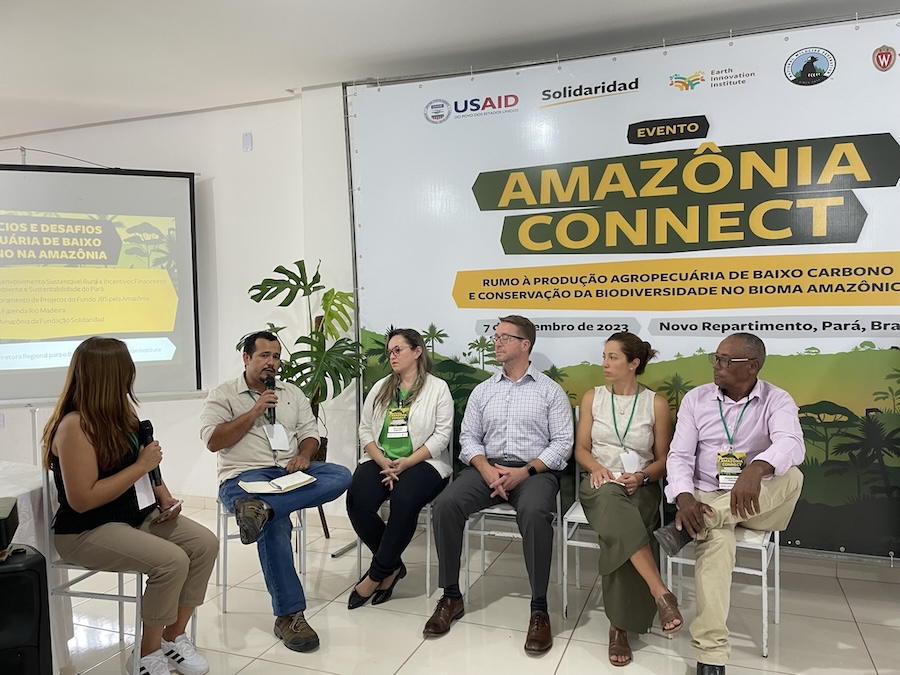
Other guests included Diana Castro, the Coordinator of Rural Sustainable Development & Financial Incentives of the State Secretariat for the Environment and Sustainability (Semas) of Pará, Jason Weller, JBS Global Director of Sustainability, and Thais Megid, JBS Fund Project Monitoring Specialist for Amazonia.
Good Practices and Conservation
Addressing emissions and deforestation requires concerted effort and creative solutions, which was discussed in “Dialogues on Amazonia Connect”. Mariana Pereira, Manager of Environment Programs and Quality Control at Solidaridad Brazil, explained Solidaridad’s strategy for working with producing families:
“Today, Novo Repartimento has the second largest cattle herd in the state of Pará and the fourth largest herd in Brazil. It is a municipality whose main economic activity is livestock farming.
“To achieve low-carbon livestock, we implement a strong and continuous technical assistance program based on four pillars: group training, individualized technical assistance, demonstration units to disseminate good practices and the use of digital tools.”
The session featured Pereira along with Monica de Los Ríos, Regional Director of Earth Innovation Institute, Rodrigo Dias Lopes, Agribusiness and Livestock Specialist of the National Wildlife Federation, and Lisa Rausch, a scientist at the University of Wisconsin-Madison. The group highlighted their organizations’ commitment to Amazonia Connect’s goals, and explored the escalating impacts of the climate crisis and the depletion of natural resources. Agriculture and its associated supply chains bear the lion’s share of responsibility for improving pasture management and the conservation of forest biodiversity.
Understanding the Context
The overall objective of the event was to move past the surface of the current status in the region to help attendees develop an in-depth understanding of the connections among all actors in the livestock supply chains.
Pedro Santos, the Technical Supervisor of Solidaridad Brazil sat down with Maria Gorete Rios, a livestock producer from Fazenda Rancho da Pedra, and Alaion Souza, from Fazenda Lírio dos Vales, for a round of questions and answers. They pointed to a need to improve the genetics of their herds, and low-carbon approaches, such as soil treatments and rotational grazing, that could improve production and reduce the need to expand ranches further into sensitive areas.
“In a larger production area, we can raise a maximum of seven heads [currently]. When we switch to rotational grazing, I can have 40 cattle in the same area,” noted Alaion while sharing his positive experience with sustainable intensification practices. “This gives us a great incentive to continue working in this new way. Rotational grazing came as a light to a problem we had.”
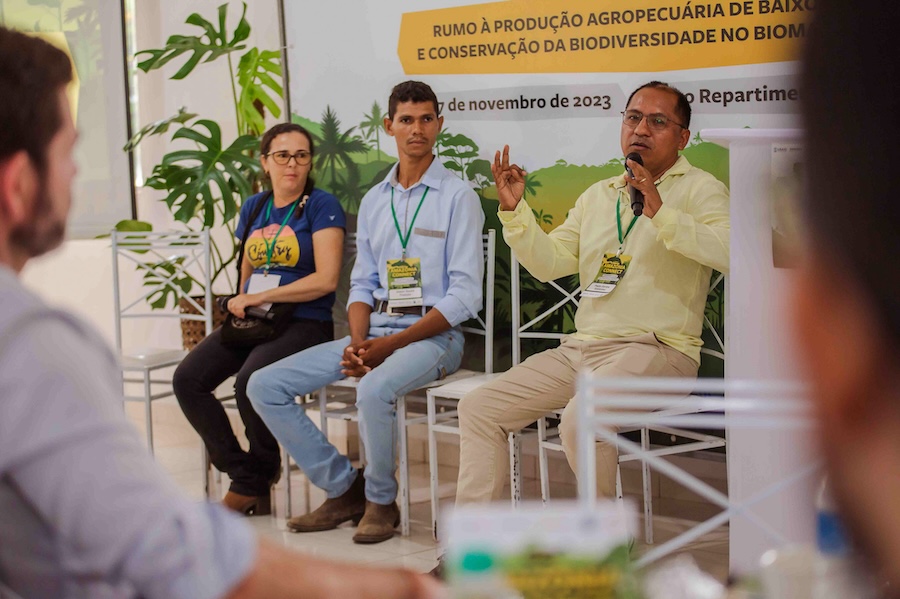
The current state of production in this part of Brazil has a long history, and understanding that history can provide glimpses of the way forward. José Heder Benatti, a professor and researcher at the Institute of Legal Sciences of the Federal University of Pará (UFPA), gave a comprehensive overview of the occupation of the Transamazônica region of Pará, and the formation of the municipality of Novo Repartimento, where the Tuerê settlement emerged in the early 1990s. Since the migratory movement to the region, more than 3,000 families have settled and primary forest has been razed for extensive livestock farming.
Benatti pointed to the need to learn lessons from the past:
“How long will we be able to produce the way we produce? We’lI have to change our behavior. If it doesn’t change, there is an ‘actor’ who will make us change: nature. She eliminates us and will do it without us. The droughts, the rains, the earthquakes, the volcanoes…all of these are her reactions.”
José Heder Benatti, professor and researcher at the Institute of Legal Sciences of the Federal University of Pará (UFPA)
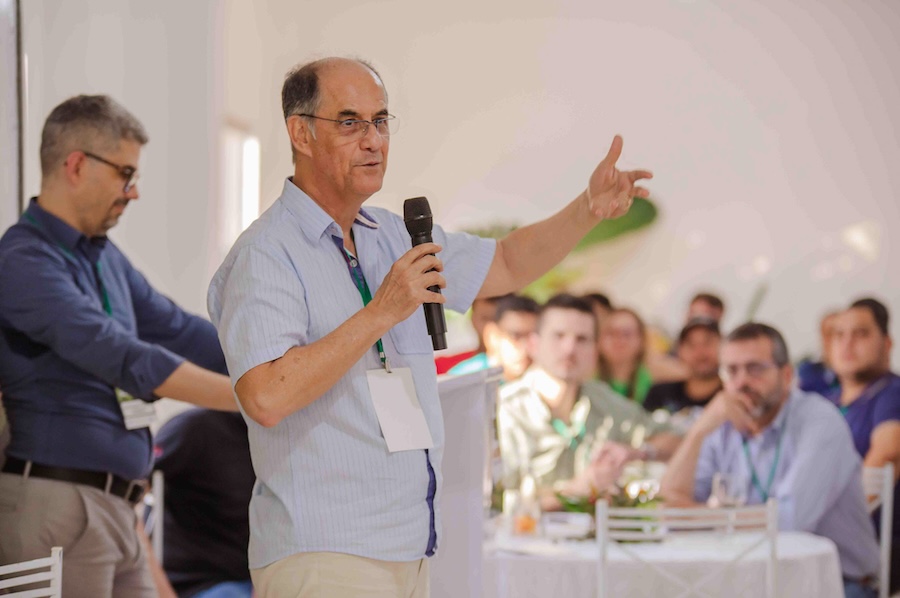
Looking to Amazonia Connect
Amazonia Connect is committed to building a better way for rural development in the region that reduces emissions and conserves biodiversity. The five-year program is a partnership between USAID, Solidaridad, Earth Innovation Institute, the National Wildlife Federation, and the University of Wisconsin-Madison. Together with USAID’s Amazon Regional Environmental Program, producers, companies, local governments and financial institutions, the initiative promotes and scales low-carbon agricultural production to improve biodiversity conservation and climate resilience in Brazil, Colombia and Peru.
Read more about the year one results from Amazonia Connect here.

